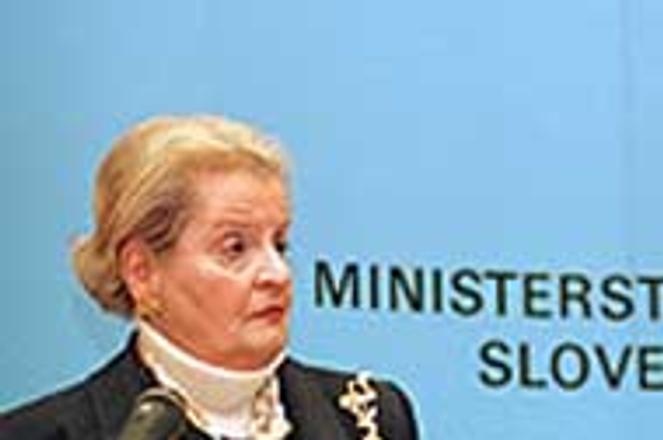Re-assessing Slovakia? US State Secretary Madeleine Albright has refused to put a date on Slovakia's possible entry to the OECD, saying instead it will depend on the speed of reform.photo: TASR
Officials from the organisation for Economic Co-operation and Development (OECD) on May 17 played down media reports that the US was blocking Slovakia's entry into the organisation and trying to defuse a potential rift between its members over the post-Communist country.
The Financial Times newspaper reported on May 16 that at a committee meeting discussing a report from earlier this year on Slovakia's entry, US representatives voiced what the paper said was 'serious concern' about economic problems, particularly the country's weak banks and its vulnerability to liberalised capital flows.
The paper went on to say that the US representatives had since sent two letters to other OECD members, and asked the grouping to lay down new conditions for the government to fulfill so as to ensure it carries out vital reforms.
"It's a bit misleading to use the term 'blocking'," said Eva Thiele of the OECD's economic department. "It seems that they [the US] have raised concerns, but the decision on the membership of a country is a consensus and maybe the US has to persuade itself over Slovakia."
Thiele confirmed that Slovakia had, technically, fulfilled all the requirements for entry - something backed up by the report earlier this year which said there were no objections to the country joining.
"Everyone is in favour of them [Slovakia] joining, but the question is only when," she said.
Parliamentary Speaker Jozef Migaš (centre) has promised to resign if anyone can pin the blame on him.photo: TASR
The US embassy in Bratislava also claimed that there was no 'blocking' of Slovakia's entry. In an official statement the embassy said: "The United States is working to ensure that Slovakia joins the OECD as soon as possible. OECD member states have not agreed on the timing of Slovakia's entry. The US position on timing will be determined through consultation among the OECD members and the Slovak authorities to identify steps that would help Slovakia implement certain reforms."
The US objections fly in the face of what seems to be overwhelming support for Slovakia, especially from European Union member states, and initial reactions from Slovak politicians were to question the economic concerns mooted by the US.
Finance Minister Brigita Schmögnerová said that the wavering in endorsement of Slovakia's OECD admission were probably due to 'non-economic' reasons, citing the recent political turbulence in the country.
The opposition Movement for a Democratic Slovakia (HZDS) has called for a referendum on early elections, and last month the leader of the ruling coalition Democratic Left Party (SDĽ), Jozef Migaš, voted against Prime Minister Mikuláš Dzurinda in a non-confidence vote.
Migaš said May 15 that he would resign if it could be proved that his vote against Dzurinda was the direct cause of the US action. František Šebej, chairman of the Parliamentary Foreign Affairs Committee, said that any eventual rejection of Slovakia's membership would be solely for political reasons since the country had fulfilled all economic criteria.
Speaking to The Slovak Spectator May 17, Šebej, when asked if Migaš's vote had really been to blame, said: "First of all I hope that this is not a final decision. But even if it was found to be the reason behind this, you will never get the treasury of the United States of America to say openly and publicly that this is the reason."
He added: "Obviously the Americans are concerned with the future of economic transformation in this country, and the future of economic measures and transformation in general are dependent upon political stability."
"I can only say that things like this, with the non-confidence vote, and signals like this, may influence decisions made in the US treasury and other countries as well, because they are actually inviting a country, not a government, to become a member of the OECD, and they have to base their decisions on reliable predictions of economic and political development. So I would say that if our entry is postponed then it is definitely something to do with political things."
Hopes had been raised that Slovakia would be asked to join in July this year, a triumph regarded as the first step on the road to membership in the European Union and NATO. OECD membership had also been held up as a positive signal for Slovakia that would open the floodgates to foreign direct investment.
However, this has been doubted by some analysts, who claim that the real key to drawing in significant amounts of investment lies eleswhere.
"The OECD may improve a country's image, but it is not the most crucial factor [in attracting FDI]," said Radek Jac of Commerzbank Capital Markets in Prague.
Jac pointed out that the potential investors would be looking more to speedy implementation of privatisation programmes and the recently introduced package of investment incentives.
"It's good to be a member of the OECD, but first you have to offer [investors] something. There are now a set of tax incentives in Slovakia that are as competitive as any others in the region, and this, along with privatisation, are the two most important things for attracting FDI."
He added: "It would be much more important to become a member of NATO. That would be the most important sign of stability in Slovakia."
The US is concerned about bringing weak and unprepared economies into the OECD prematurely following financial crises which hit other OECD members soon after their accession - including Mexico, South Korea and the Czech Republic.
EU states, on the other hand, argue that the benefits of tying another ex-Communist country more firmly into international economic structures outweigh the dangers.


